I have my two favorite granola recipes, one with peanut butter and chocolate chips, and another with a base of apples - but may I add a third? Yes? Thanks!
The first one of my favorites, with peanut butter and chocolate chips, is unabashedly a little decadent, a word that I’ve never used to describe food (due to it being overused, and I’m not a fan of anything culpabaliser food.) But even though there are oats, honey, and sunflower seeds, with peanut butter and chocolate in it, it’s not fooling anybody.
That’s okay. I don’t eat a giant bowlful of granola, but sprinkle it over my daily, mid-morning bowl of fruit. First thing in the morning, I’m a coffee and toast guy. But a little later, I go for fruit. Years ago I took a pretty intense step aerobics exercise class in San Francisco, which, because it was at noon, was made up of a bunch of regulars whose work fit “outside of the box,” (i.e.; not 9-to-5) including a flight attendant, a drag performer, a restaurant cook, an airport baggage handler, one of my favorite actresses, someone with a pr firm, and a forthright blonde woman who told us (during sit-ups) about her dates with men that were less-than-successful. And yes, she included details.
Midway through class one day, the instruction, a compact, and very powerful woman (who had the most amazing energy and got us to do whatever she wanted us to do) came around to ask us what we each had for breakfast.
Most of us offered up things like “uh…coffee,” or (sheepishly) “a half a muffin.” Afterward she went into a diatribe on how we were working very hard (which none of us disagreed with…) and that we needed to fuel ourselves. So I started eating more in the morning, which became a bowl of fruit, granola, and yogurt.
In France, people don’t eat mid-morning, unless they stop at a pastry shop and get a croissant or pain au chocolat, which may be the only thing they eat that morning, until lunch. I’d like to do that too, and sometimes indulge, but since I’ve already had bread for breakfast, I think it’s more prudent to have a bowl of fruit.
Romain’s father, however, was stunned to see me eating a bowl of fruit one morning around 10am. He leaned over, took a look in my bowl, and said “C’est incroyable…” which was against everything he knew and believed in, and is pretty ingrained in French culture: Prescribed mealtimes. I also detected that he would’ve liked some, too.
Sure, you can buy granola, called muesli in French (with no ü), but I don’t mind making it and what I like about making it myself, is that I know what’s going in it. I don’t need tablespoons of cinnamon, a cup of oil, or dehydrated strawberries in mine - and there’s nothing wrong with either - but I like it crunchy, nutty, and with clumps here and there.
I also do make my own candied ginger from time to time, but if I made everything from scratch, I wouldn’t have time to see Romain, dream about eating a croissant as I walk along the Seine, and write this newsletter. So I sometimes do buy things, such as candied ginger, which admittedly, is often better than what you can make at home. Like tinned coconut milk and shredded coconut, they’re from countries that often have better (or riper) ingredients close to where they are made, rather than the coconuts that arrived a month ago at your local Safeway or Marché U.
Years ago I bought some fresh ginger at my local supermarché and the young woman at the cash register looked at the knob I put on the conveyor belt as if I’d laid down a dinosaur bone. Nowadays fruit and vegetables exotiques are much more common (you no longer needed to go to the swanky place in the Place de la Madeleine and pay €23 for a pineapple), and you find items like ginger, physalis, aka: cape gooseberries, and even aloe, at grocery stores in Paris. There’s also a drink called Gimber, which comes with a wallop of fresh ginger, that’s become popular and has quite a kick.
I am also sure the ginger that’s used to make candied ginger in tropical countries involves young ginger, which is more tender and has fewer fibers than the mature fresh ginger most of us have access to at grocery stores. I do buy dried figs, which are available in grocery stores and multicultural food shops, since I don’t have a fig tree - yet. But having a figuier (fig tree) is on my list...
This recipe, which I’ve been making for a few years, comes from Tara O’Brady’s book Seven Spoons. I never personally met Tara but we corresponded back in the day when food bloggers were a small, cohesive group and we all knew (and sometimes talked) to, and about, each other. But only in the nicest ways.
Tara was lovely but we never got a chance to meet, although I suspect that one day we will. I’ve always loved her style and the look of her food, which is fresh, alive, and unscripted, which was new at the time (she started her blog back in 2005) and has since become more à la mode across the internet. She talks about food from a personal point of view, which has a way of making you want to run to the kitchen to make her chocolate chip cookies or infuse your next pot of squash soup with coconut milk and curry. Tara also wrote a thought-provoking essay in Bon Appétit; The Color of My Skin Is Sometimes Confused with the Scope of My Talent talking about the challenges people face cooking inside, or outside, of their cultures.
I think I can confidently say that anyone can, and should, make this granola. It’s loaded with nuts, seeds, dried figs, and candied ginger. I played around with it a bit, but the recipe is easily customizable. If you don’t like or have sunflower seeds or coconut, you could leave them out. I used sesame seeds but you’re welcome to go with chia or flax seeds. And I find honey works as well as maple syrup, although since Tara hails from Canada, you might want to stick with maple syrup, or use a different alternate liquid sweetener, such as agave or sorghum, if another one floats your boat.
Fig and Ginger Granola
Adapted from Seven Spoons by Tara O’Brady
This is a “hands-on” project, meaning that you will need to get your hands into it. Of course, they should be scrupulously clean, which is easy nowadays…now that we all have hand sanitizer with us at all times. If you like your granola clumpy, when you distribute it onto the baking sheet, squeeze small handfuls of it into clumps, then drop them on the baking sheet.
If using honey, the mixture may not be as clump-friendly as maple syrup, so if you find the mixture a little dry, sprinkle in a few teaspoons of water or olive oil, or maple syrup, until it’s where you’d like it to be.
I used untoasted cashews but you can use another nut, such as walnuts, almonds, hazelnuts or pecans. For those of you who don’t have a food processor for grinding the oats, I think you can do it in batches in a blender. I haven’t tried it but blenders can do wonderful things, too.
4 tablespoons (2 ounces, 55g) butter, salted or unsalted, cubed
3 tablespoons (35g) olive oil
3 tablespoons (75g) maple syrup or honey
1/2 cup (90g) packed light brown sugar
1/2 cup (125ml) water
1 teaspoon flaky sea salt or kosher salt (if using Morton’s or fine table salt, I’d cut that down to 3/4 teaspoon)
1 teaspoon vanilla extract
5 cups (455g) rolled oats (not instant)
1 1/2 cups (200g) nuts, very coarsely chopped (you don’t want them too fine, you kind of want them cut most in halves with maybe a few in thirds in there)
3/4 cup (110g) shredded or flaked coconut, sweetened or unsweetened
1/4 cup (35g) raw sunflower seeds
1/4 cup (35g) sesame seeds
2 teaspoons ground cinnamon
1 teaspoon ground dried ginger
1/2 cup (70g) candied ginger, diced
1/2 cup (70g) raw pumpkin seeds
1 cup (5 1/2 ounces, 150g) diced dried figs (hard stems removed)
Preheat the oven to 325ºF (165ºC) and line two baking sheets with parchment paper.
In a medium saucepan, warm together the butter, olive oil, maple syrup or honey, until the butter is melted. Remove from heat and stir in the brown sugar, water, salt, and vanilla, until the sugar is dissolved.
In a food processor, grind 2 cups (180g) of the oats until they resemble flour. Add the ground oats to a large mixing bowl, along with the remaining rolled oats, nuts, coconut, sunflower and sesame seeds, cinnamon, and dried ginger.
Pour in the melted butter, olive oil, and sugar mixture and stir well. Let rest to hydrate for 10 minutes.
Using your hands, distribute the mixture evenly over the two baking sheets, squeezing small handfuls here and there (see photo in post) of the mixture so that it falls into rough clumps. If the granola isn’t clumping enough you can add a few teaspoons of water, olive oil, or maple syrup, until it holds together reasonably well.
Bake the granola in the oven, check it every 15 minutes and give it a stir, rotating the baking sheets and switching racks, until the granola is evenly golden brown. It’ll take about 40 to 50 minutes, but everyone’s oven is different (unfortunately!) so use your judgment if necessary.
Remove from the oven and mix in the pumpkin seeds. Wait 5 minutes then stir in the candied ginger. When completely cool, mix in the fig pieces.
Store in an airtight container. It’ll last about two weeks.
Thank you for subscribing to my newsletter!
Follow Tara O’Brady on Instagram and subscribe to her Substack newsletter.


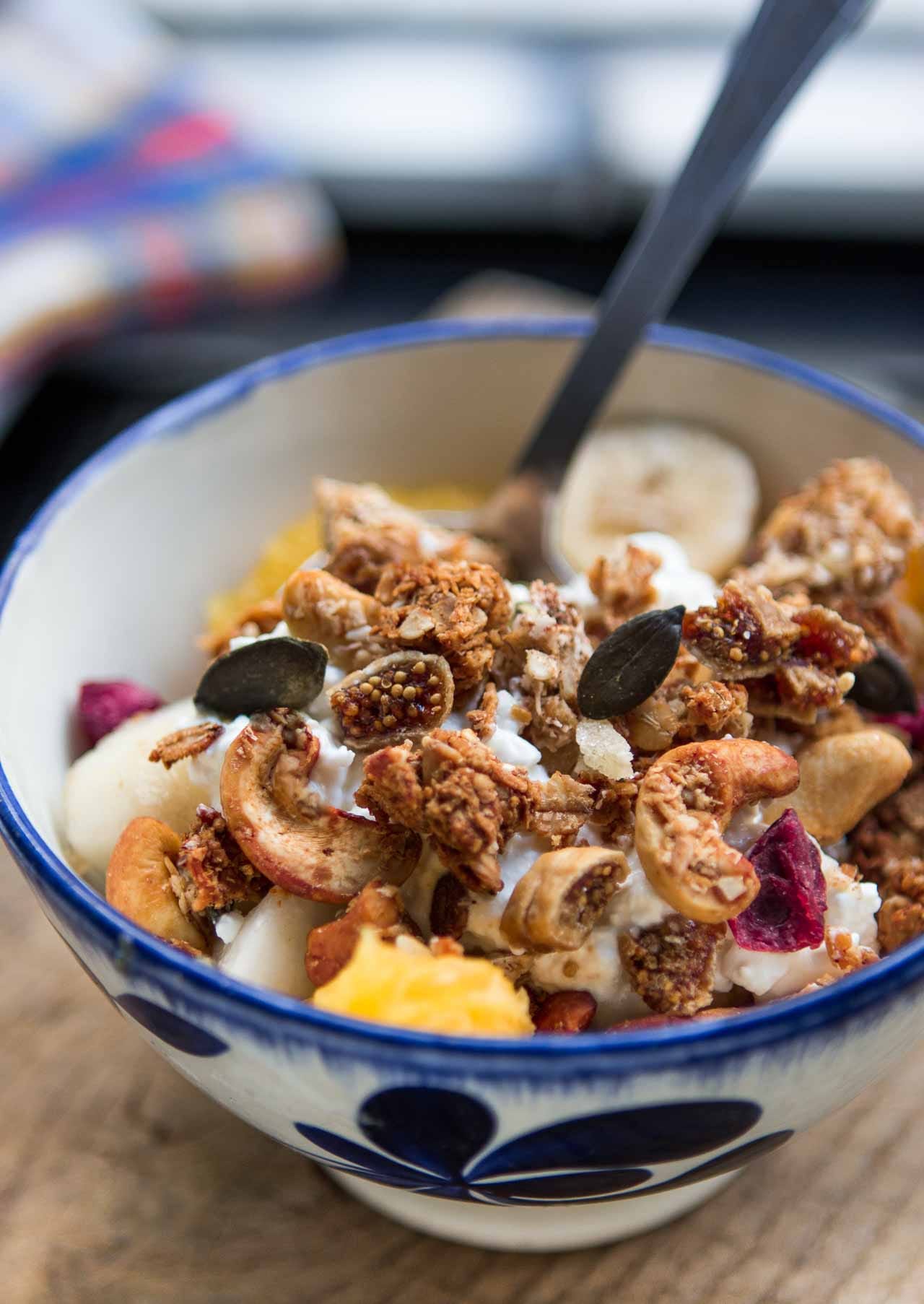
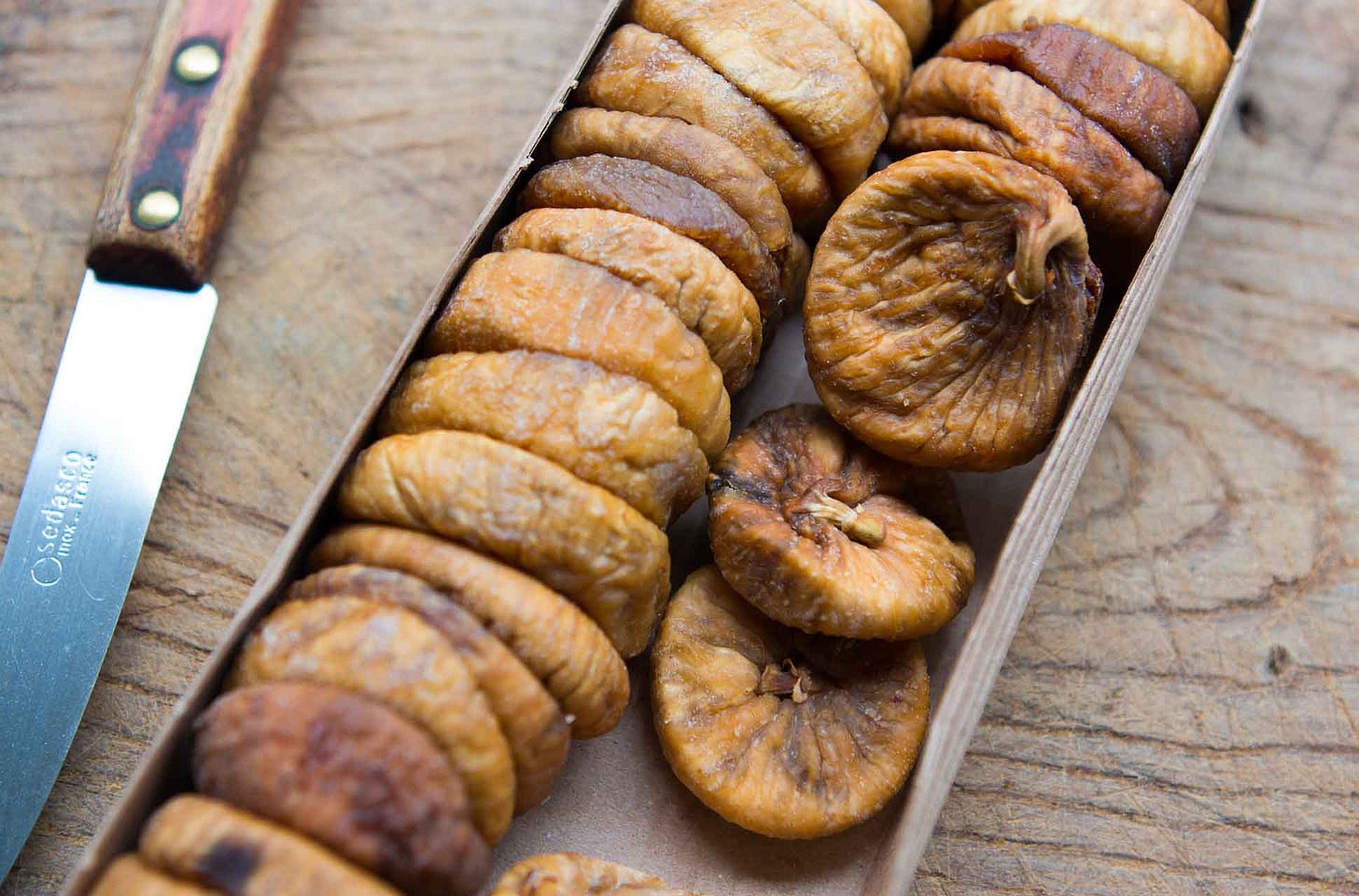
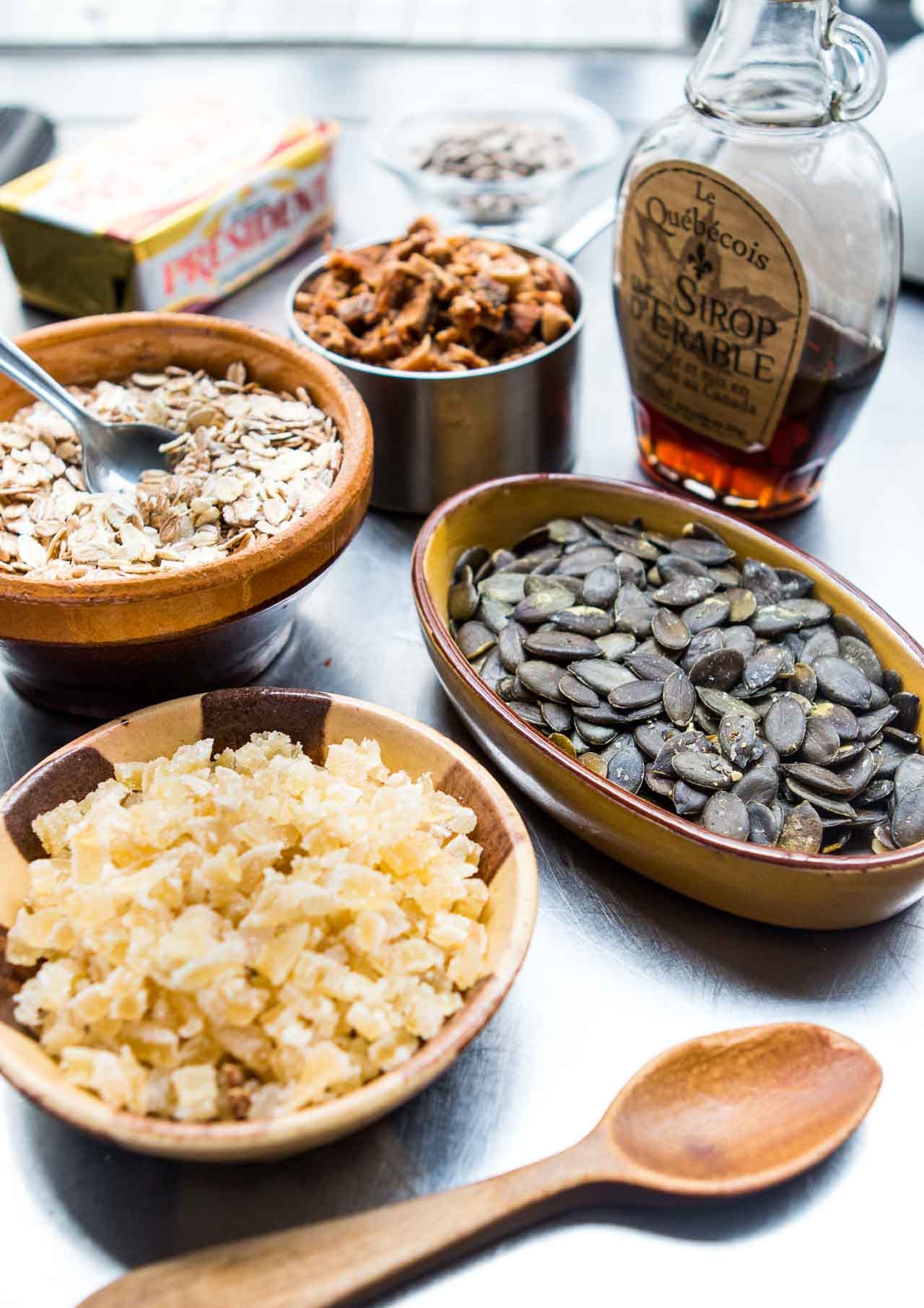
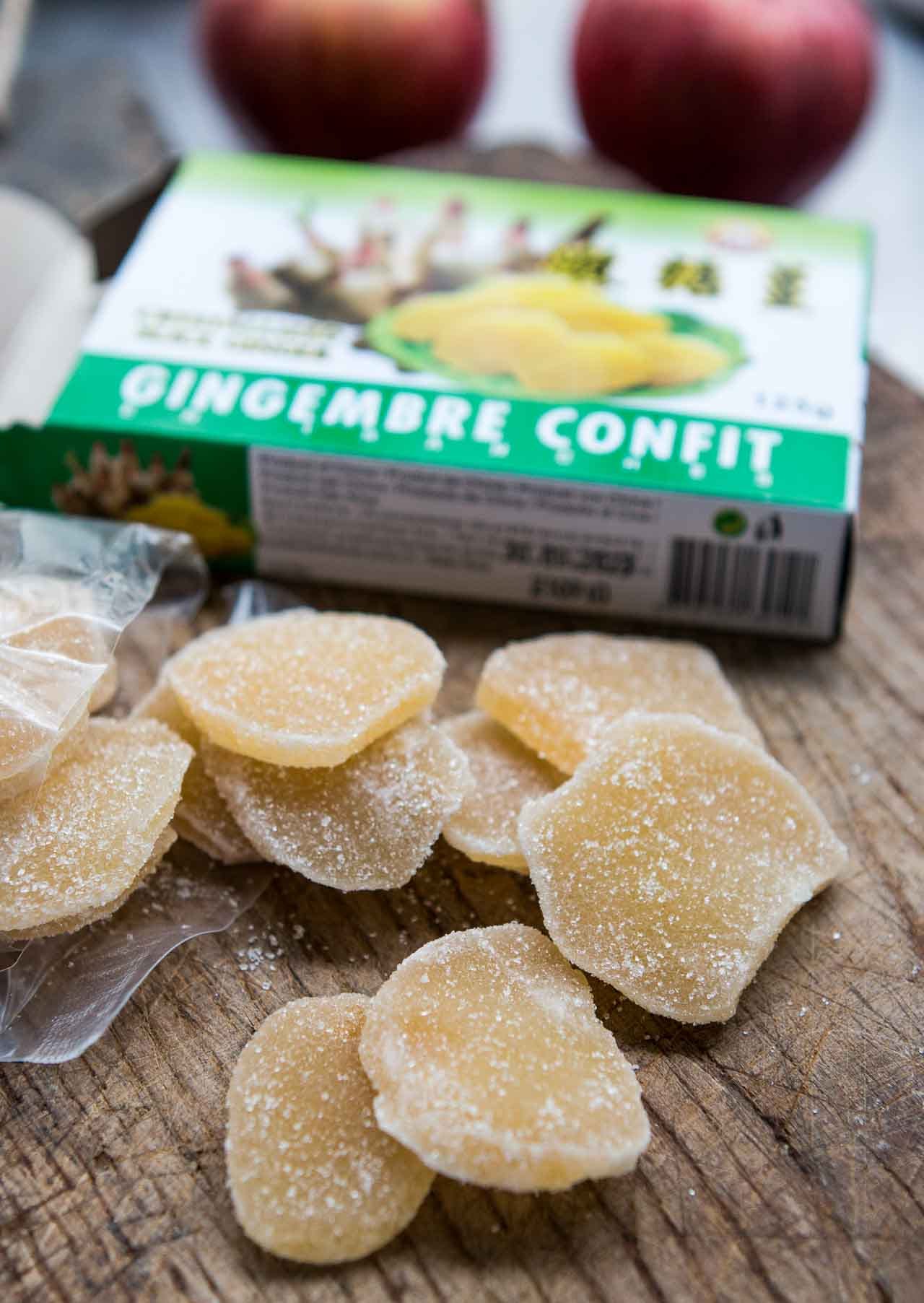
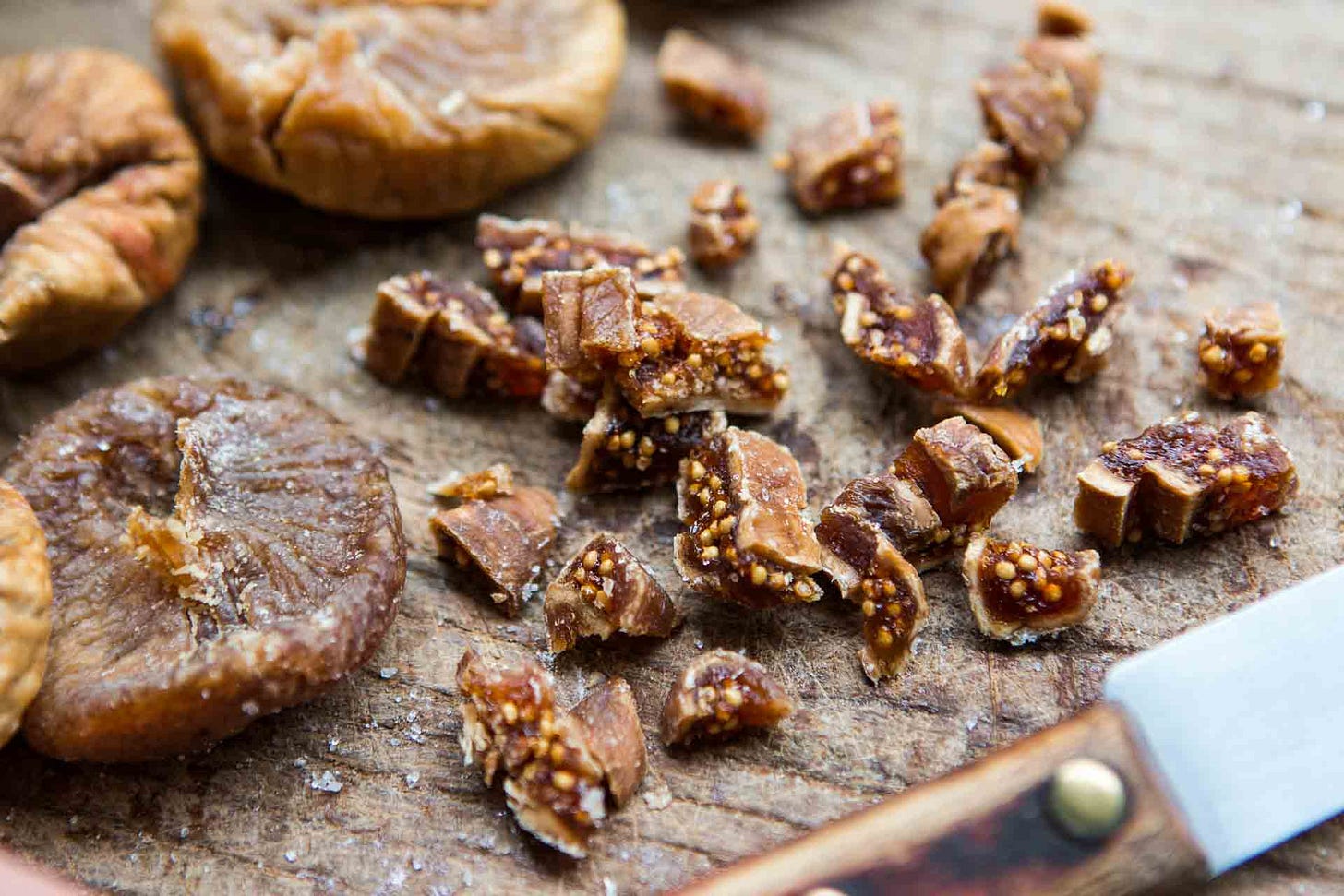
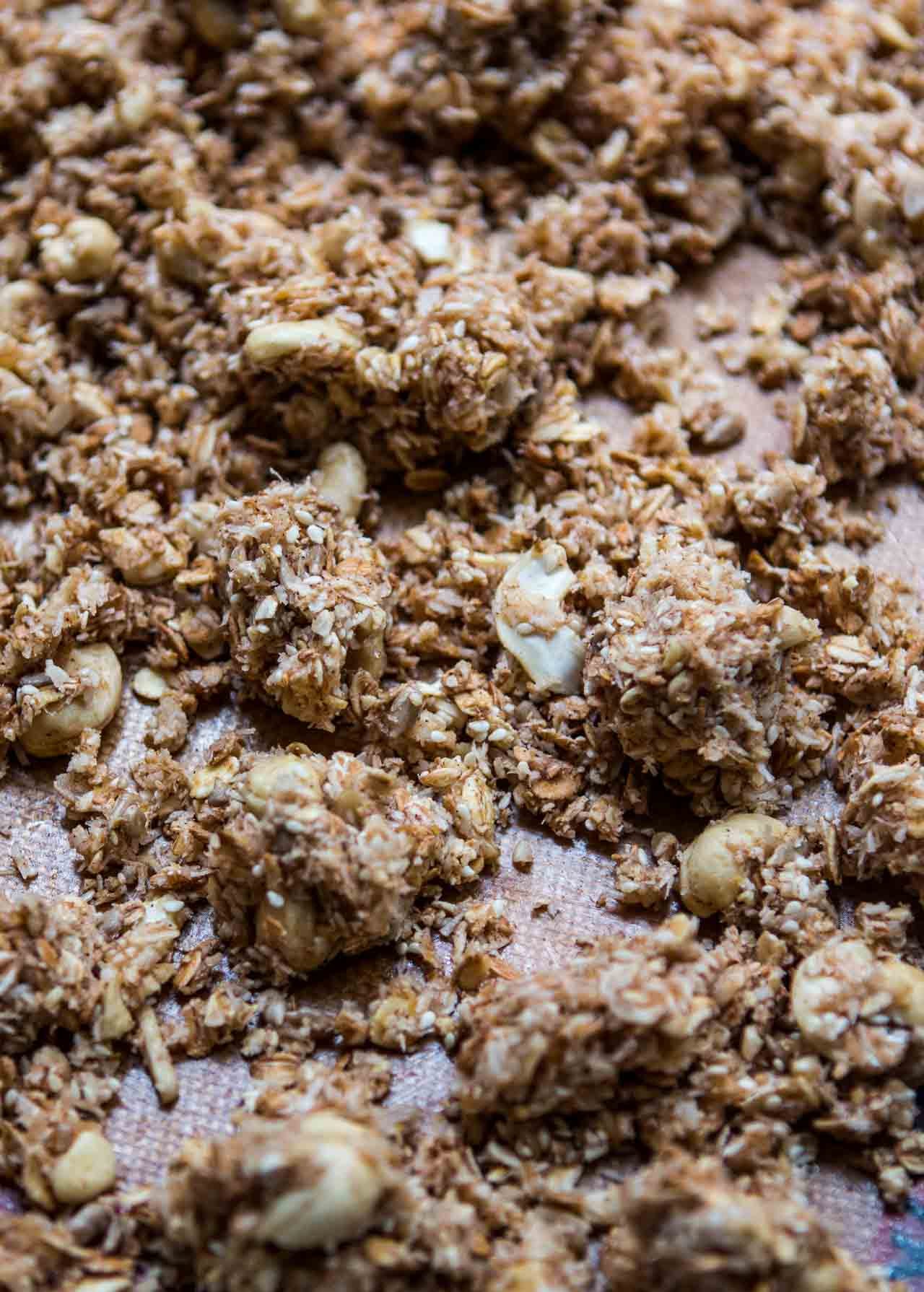
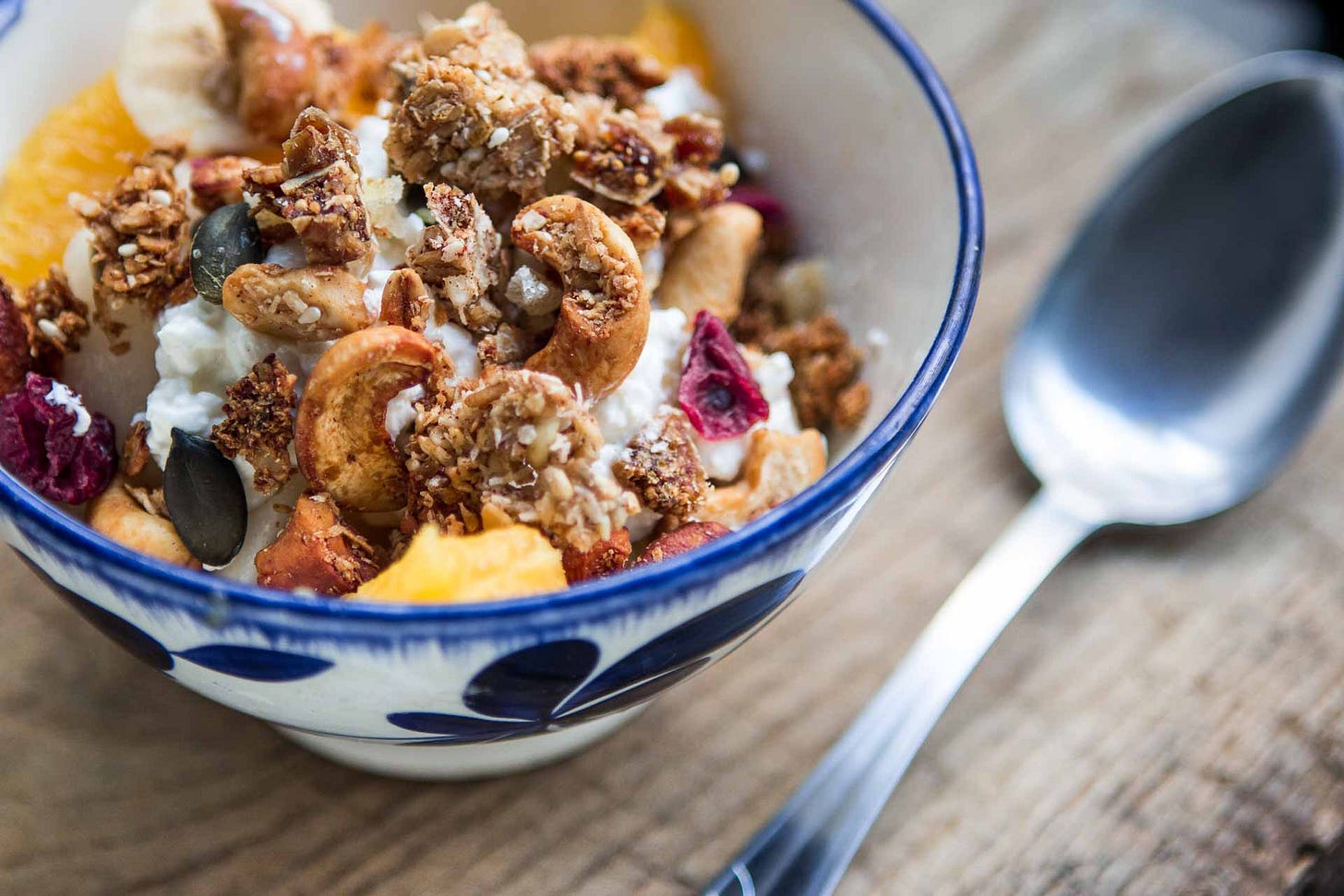
My question was answered. I read the recipe several times and couldn't find the figs.
Last night I pulled out the Seven Spoons cookbook—what a coincidence! I have all the ingredients so I can’t wait to make this. Thanks for sharing.